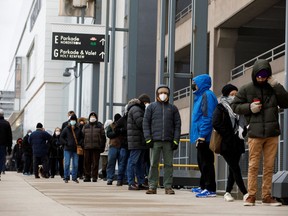At -Home COVID Recovery
 |
| iStock |
"The most important thing is to keep your antennae up and get medical attention promptly if it starts behaving like a not-mild illness.""Your immune system will get rid of this ... so the important thing there is, [is to] support your immune system. Eat sensibly, eat healthy food. Your body needs good nutrition to support your immune system.
This is not the time to skip your fruits and vegetables.""It's not going to make you better, but it'll help you not suffer as much until your immune system makes you better [over-the-counter painkillers]."Lee Green, chair, Department of Family Medicine, University of Alberta"You don't want to miss it when somebody is getting to the point of needing oxygen or specific therapies for COVID that are only available in a hospital setting.""And so there is value, particularly in the older and people that have comorbidities, to monitor their own health more closely in terms of temperature, maybe check your heart reate, your breathing rates, and seriously think about getting a pulse oximeter."Noel Gibney, professor emeritus, School of Medicine, University of Alberta

The experience is different for everyone; depending on age, health condition, and all manner of variables. The latest surge of COVID-19 racing through Canada has resulted in record-breaking case counts in some provinces with 207,418 active cases in the country as a whole, mid-week; just over 1,201 admitted to hospital, while according to the Public Health Agency of Canada large numbers of people are isolating at home while recovering from an infection.
No evidence exists, according to the U.S. National Institutes of Health, that vitamin C supplements are of any practical use as a home 'cure' for COVID. Insufficient evidence exists for vitamin D or zinc to be recommended as potentially curative supplements. So when people are infected with Omicron, they're left to their own devices and that usually boils down to methods used for most types of infection of the respiratory tract: rest and fluids.
Resting, exercising, and eating healthily while in isolation is highly recommended by the Public Health Agency of Canada, as well as making use of video calls in communication with friends and family. COVID-19 symptoms are not dissimilar from a whole host of other illnesses, although there are also those testing positive for the coronavirus who are asymptomatic. Legal requirements are to isolate if ill with COVID, including for those with exposure to others who are infected.
Symptoms such as coughing; 38 degrees Celsius temperature or higher; chills; body aches; weakness and fatigue and conceivably, shortness of breath. Symptoms that are similar to many other types of illness, and like them, the recommendations for home treatment and recovery are also similar. A closed, steamy environment may help alleviate congestion. And balm on a nose exposed to too much wiping can be a relief.
Ibuprofen or acetaminophen can be used to alleviate discomfort according to the National Health Service in the United Kingdom, while at the same time the PHAC recommends the avoidance of painkillers which "could hide an early symptom of COVID-19", if an individual is in quarantine from an exposure, but not yet confirmed to be COVID-positive.
"There is no scientific evidence that establishes a link between ibuprofen and the worsening of COVID-19 symptoms", read a Health Canada notice in response to early pandemic social media posts claiming the ove-the-counter medication had the potential to worsen COVID-19. "Water, soup, fruit juice and hot tea with lemon are all good choices", along with "extra rest to help feel better", a message from the government of Alberta.
The NHS suggests avoiding lying on one's back in bed, sitting upright or lying to one side, instead to facilitate easier breathing. Cough medicines not recommended for those under six years of age, can help alleviate symptoms in older people. Above all, "good advice anytime is the suggestion to abstain from smoking or breathing second-hand smoke while ill with COVID-19". "It's a good idea to take your temperature if you feel badly ... if you're feeling terrible and if you feel like you might have a fever, make sure to check", advised Dr.Green at the University of Alberta.
Some symptoms are not to be managed at home. Presenting for medical attention at a hospital is highly recommended with significant trouble breathing, with chest pain or pressure, with a new onset of confusion or difficulty waking from a sleep. The risk is for people who begin with a mild illness then proceed to a worsening situation. A pulse oximeter to tell blood oxygen level providing a warning sign of when to seek medical care, is recommended by Professor Gibney of University of Alberta's school of medicine.
 |
Labels: Global Pandemic, Infection, Isolating, Omicron, Personal Care, Surging Case Loads

0 Comments:
Post a Comment
<< Home